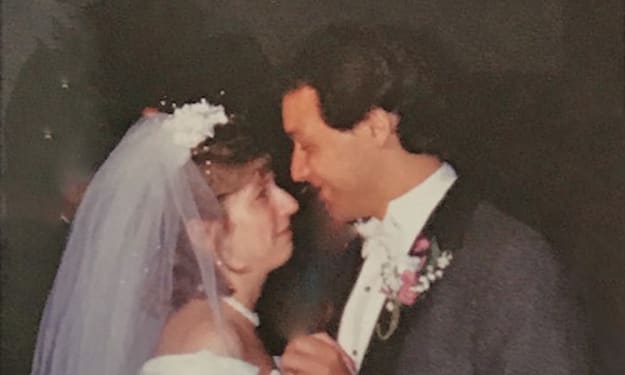Man, I love you
Why do straight men find it so hard to say I love you to one another?

Nearly eight years ago, my Dad took his own life.
A few months later, one of my closest friends, aged only 34, died suddenly. After an innocuous bike ride, he went for a lie-down and never woke up. An unknown heart condition stole a friend who was the light of every room he walked into.
They were two men who meant the world to me. Two men I miss every single day. And two men I didn't say 'I love you' to anywhere near enough. What the fuck?
Why is it so damn hard for a 'straight male', a 'heterosexual male', a man like me to say to any of the other straight men in my life when I feel it, when they deserve to hear it, and when they might need to listen to it that: I. Fucking. Love. Them. What's wrong with me? What's wrong with us?
Oh! Boo hoo! I hear some of you scream. Poor little straight boy has Dad issues. Cry me a river! But hear me out. Straight men not being able to tell other straight men that they love them is an issue. This is a serious problem that almost certainly also negatively impacts people of all genders, both directly and indirectly.
I genuinely can't help thinking that a lot of history might have been a lot more pleasant for a lot more people if a few more straight men had said and, perhaps more importantly, heard the magical triptych of 'I love you' from the mouths of the men they called Dad, Brother, Friend or Comrade.
So, what's my problem? Why do I still feel a hole in my heart for not telling my Dad and my friend just how much I loved them?
It trips off the tongue when ending a call to my Grandma, or when I leave my wife to go anywhere, or when I visit my Mum. Fuck, even our three cats are told it numerous times a day by me whilst I boop their noses or fluff up their fur. If my cats could speak, I am pretty sure they'd say they were slightly worried about my infatuation for them and that perhaps we should go on a break because they need more space. Instead, they tend to give themselves a dramatic shake after I have smothered them and give me a judgemental cat frown. They seem nonplussed by my adoration for them.
Yet, when it comes to saying the same three words to all the straight men in my life, I can't.
I need to unravel this complexity in saying I love you to men I feel it for. What's wrong with us? How have we got it so wrong? Why do the people that so many of us spend our time with and with whom we love spending our time never get told this important truth?
Now, I know I am generalising grossly here. There are, I am sure, plenty of straight men who vocalise love towards other men all the time. But I am not talking about the frat boy love expressed after a few red cups of continental lager. This is less about slurring 'I love you, man!' while chugging a beer and more about heartfeltly saying, 'Man, I love you,' and hugging someone who means something to you.
I undoubtedly feel deeply towards the men in my life. It's an emotion deeply rooted in me that makes me look forward to and value spending time with the boys. I am sure other men feel this emotion as deeply as I do, and I am equally sure that for time immemorial, men have, through their actions, demonstrated love to one another in both glorious and abject settings.
Maybe those Ancient Greeks said it all the time! Perhaps Genghis Khan was forever shouting it to his legendary horsemen. Maybe in the trenches of France, men summoned the courage to say it to one another before they summoned the courage to go over the top. Who knows? I don't. I do know that for some reason, the man I am, who I have grown into, still struggles to say it. And it can't just be because I am a Yorkshireman.
At the heart of this enigma that troubles me lies the conundrum of masculinity. It's 2024, I am 42 years old, and I have never been less sure of a term than masculinity. What the hell does it even mean anymore? I haven't heard or read the term in the last few years without seeing it prefixed with the adjective 'toxic'. Conversations about gender and sexuality are everywhere. Whilst many are positive and long overdue. Many others, especially those in social media's dark corners, are not.
Masculinity, or being a man, it feels has never been a worse thing to be. But I am sorry. I was born that way. It's who I am. I am a straight man, and there's nothing I can do about it. It's in my DNA. Being a man is a construct that has shaped and constrained my emotional core.
From a young age, I have heard the indoctrination. 'Boys don't cry'. 'Man up.' 'Grow some balls.' A tapestry of cliched lines that valorises stoicism and suppresses vulnerability. My Mum always told me there was nothing wrong with a boy crying. And I know that. But I am still biting that bottom lip at a funeral. I never went, despite the desire, complete chest-beating, and wailing war widow at my Dad's funeral. But I wanted to.
Somewhere along the line, I have learned to equate strength with emotional detachment, that tying in a knot and burying my feelings in a tiny box beneath my heart creates a facade of toughness. It's within this rigid paradigm that expressions of love and affection by men have, somewhere along the line, been deemed signs of weakness. For many men, uttering the words "I love you" to another man becomes an existential crisis.
Do I fear self-emasculation by uttering these words to another man? I don't know. But in a world where masculinity is synonymous with dominance and control, does the admission of love for another man threaten to undermine one's perceived power and authority and skew the mute perfect man-to-man relationship you have.
I am so uncomfortable discussing my masculinity, my manhood in this way, that I actually just broke for twenty minutes from writing this to fix a wobbly door, which had been mocking me for weeks the way it half hung off its hinge. It's now fixed. We no longer need to lift and pull to close it. It is back to just a pull to close it.
Does admitting love face to face for a fellow man invite mockery like the door has of me for weeks? The spectre of ridicule, the fear of being labelled as 'soft' or 'unmanly' by my peers. Do I care? I once did. But have the crushing deaths of my Dad and friend, in reality, destroyed this charade of masculinity? The pressure to conform to rigid gender norms becomes a suffocating force, stifling the expression of genuine emotion and perpetuating a cycle of emotional repression. And perhaps no gender norm is more suffocating than that of 'straight man'. It's tedious. It's worn out, and it is tiresome for everyone. Has it ever even really existed?
Beneath the paper-thin sham of my manhood lies the profound yearning for connection. We all crave love and validation. We all seek solace in the warmth of human connection. We all yearn for the freedom to express our emotions unabashedly and to break free from the shackles of gendered expectations. Deep down, we all want to embrace the full spectrum of humanity. We all need to say and hear the words I love you.
But is it the word 'love' itself the problem. In English, it's a term used to describe a wide range of feelings. 'I love this cheesecake.' 'I love this movie;' they're not the same as 'I love you.' Has the way I have so ineffectively used the word for trying to articulate feelings that really aren't love muddied its actual use and when I genuinely need to use it?
It's been hard-wired by literature and movies that love should carry significant weight. Do I hesitate to use the word because it is so often associated with marriage, long-term commitment and sexual love? Does it cut, has it ever cut, the mustard to describe the platonic love between two men? Of course, it must be powerful enough to represent a relationship not built on physicality, as I use the words regularly to express familial love to the females in my life.
Saying I love you to a best friend doesn't mean I want to marry them and have their children. It means I feel something so powerful towards them that it is worthy of expression and confirmation in words.
As cliched as it sounds, a simple truth has to emerge: love knows no bounds. It transcends gender. It defies convention and blooms in the tender spaces between two souls, whoever they are. To love another human is not a sign of weakness; it's the ultimate act of strength and humanity. Most of all, it allows us to embrace our authentic selves.
So, as a heterosexual man who has found it hard to tell other men that I love them, I need to realise that my struggle is not in vain. The human experience is profoundly complex, and nothing more so than understanding who we love and who loves us.
Societal forces have shaped my perceptions of my masculinity and what love is. I need to recognise that my strength lies in my vulnerability. In my authenticity lies my power. Daring to defy convention, daring to speak your truth, and daring to love without reservation is what defines everyone of all genders. As humans, it t is love that binds us together, transcends the constraints of gender and society, and illuminates the path towards genuine connection and belonging.
Dad, I didn't say it enough to you, and Chris, I don't think I ever said it to you once when you were here. But I need you both to know that I love you with my entire being and every essence of my soul. I loved you when you were here. And I love you every moment of every day that you aren't here.
I am sorry I didn't say it enough or at all. I will get better. I need to go now and tell others I love them, too.
But one more time.
Dad, I love you.
Chris, I love you.
About the Creator
Leo Dis Vinci
UK-based creative, filmmaker, artist and writer. 80s' Geek, Star Wars fan and cinephile.
Reader insights
Outstanding
Excellent work. Looking forward to reading more!
Top insights
Easy to read and follow
Well-structured & engaging content
Excellent storytelling
Original narrative & well developed characters
Expert insights and opinions
Arguments were carefully researched and presented
Heartfelt and relatable
The story invoked strong personal emotions







Comments (1)
Congratulations on earning Runner Up placement in the Challenge. This piece cuts into a ton of psychology and societal conditioning that I cannot begin to speak to, but I feel I understand it a bit more having read this piece. Thank you for going there. Thank you for loving who you love. And please accept my heartfelt condolences on the losses of your father and your friend.